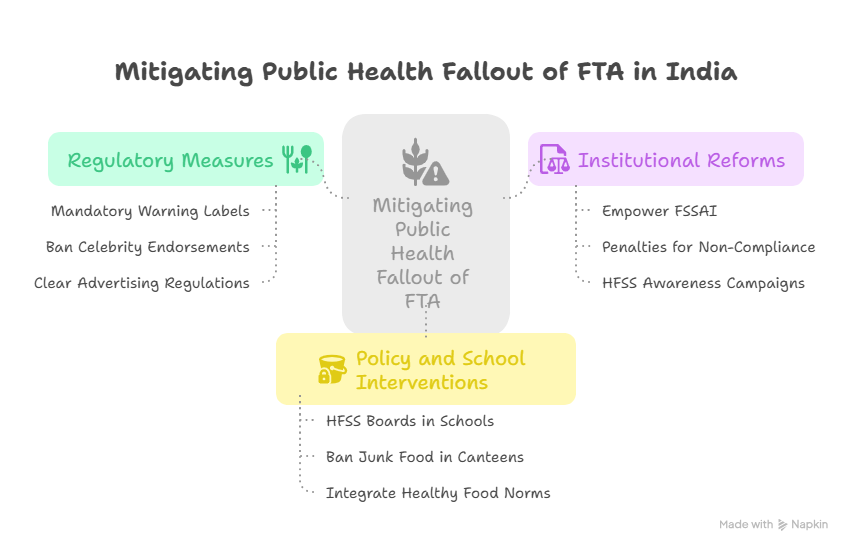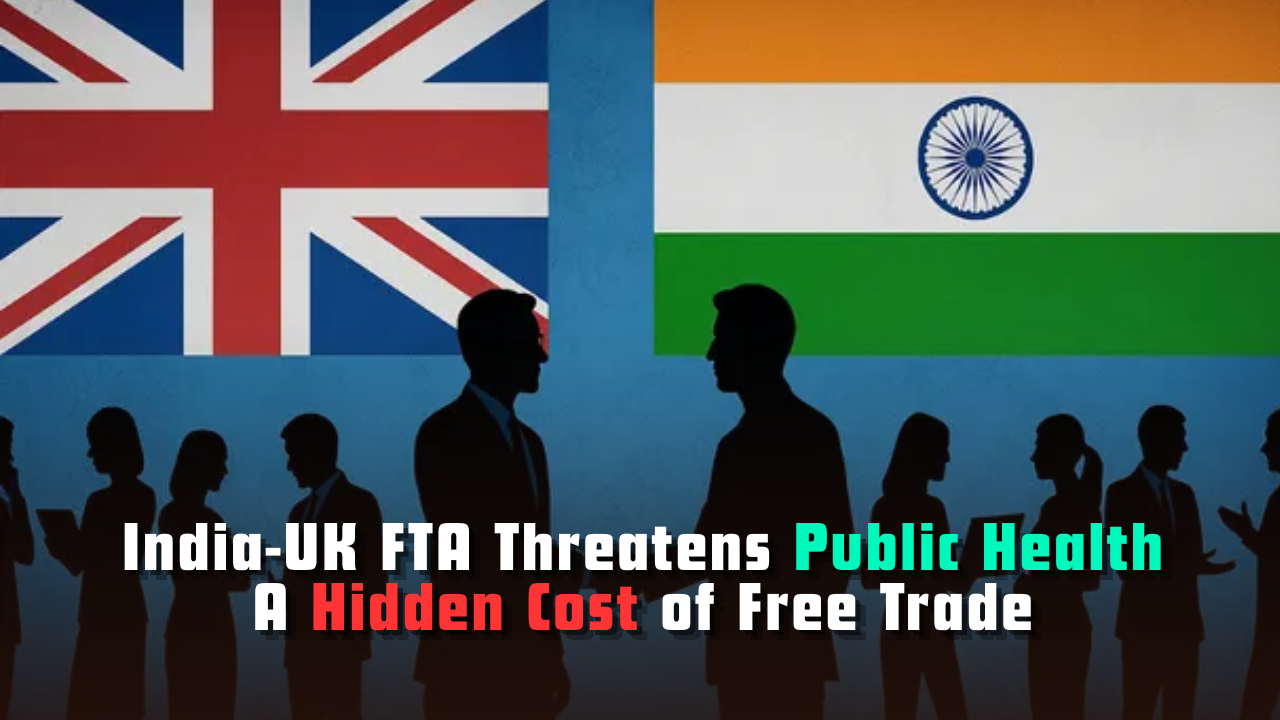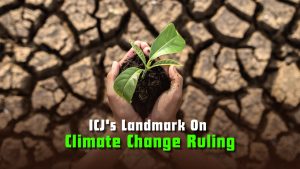India-U.K. FTA Threatens Public Health: A Hidden Cost of Free Trade
India-U.K. FTA Delivers a Blow to Public Health Protections
What is India-U.K. Free Trade Agreement (FTA)?
The India-U.K. FTA, officially called the Comprehensive Economic and Trade Agreement (CETA), was signed on July 24, 2025, during Prime Minister Narendra Modi’s visit to the U.K. The Union Cabinet had approved it on July 22, 2025. The deal was finalised after negotiations concluded on May 6, 2025.
It aims to enhance trade by reducing tariffs, increasing market access, and simplifying regulations across sectors such as services, technology, pharmaceuticals, and agriculture.
Context: The recently signed India-U.K. The Free Trade Agreement (FTA), while promising economic gains, has raised significant public health concerns. By allowing tariff-free entry of High Fat, Sugar, and Salt (HFSS) food products such as chocolates and soft drinks, the FTA could worsen India’s growing burden of lifestyle diseases.
Why is the India-U.K. FTA a public health concern?
- While the FTA has economic merits, it poses serious public health risks by easing tariff-free entry for High Fat, Sugar, and Salt (HFSS) products like soft drinks, chocolates, and biscuits manufactured in the U.K. These products, once cheaper and more accessible, are likely to be aggressively marketed in India.
- According to the Economic Survey 2024-25, HFSS consumption is a major driver of India’s rising non-communicable diseases (NCDs), particularly among children and adolescents.
Where does India currently stand on regulating HFSS foods?
- India has weak enforcement and insufficient regulation of HFSS products:
- No binding laws prohibiting advertising of HFSS foods targeted at children.
- Reliance on self-regulation by the Advertising Standards Council of India (ASCI), which lacks enforcement power.
- Celebrity and cartoon endorsements of junk food are unchecked, despite public acknowledgments by some endorsers that they do not consume these products.
- In contrast, the U.K. has strong measures, such as: A ban on HFSS ads on TV before 9 p.m, A complete ban on online HFSS ads effective October 1, 2025 & A Traffic Light Front-of-Pack Nutrition Labelling (FOPNL) system that clearly signals nutritional content.
Who is likely to be most affected by the FTA-induced influx of junk food?
- Children are vulnerable due to targeted advertising using cartoon mascots and celebrities.
- Adolescents and young adults, often consuming cheaper packaged food, face a higher risk of obesity and lifestyle diseases.
When and where have similar FTAs led to public health crises?
Mexico’s experience with NAFTA (1992) is a global case study:
- Mexico saw a surge in cheap, processed U.S. foods after NAFTA, leading to high obesity and diabetes rates.
- Mexico tackled the crisis through regulatory measures like a soda tax, warning labels, and school food bans.
- As India negotiates FTAs with the U.K. and EU, it must anticipate and guard against similar public health.
- Economically disadvantaged groups, who may opt for inexpensive, nutrient-poor food, are at risk of dietary-related NCDs due to lack of awareness or healthy alternatives.
- Case in Point: A 2025 Lancet study shows a sharp rise in adolescent obesity in India, strongly linked to HFSS and Ultra-Processed Food (UPF) consumption, which grew at a 13.3% CAGR between 2011-2021.
How effective is India’s proposed Front-of-Pack Labelling (FOPNL)?
India’s FOPNL efforts have been delayed and diluted:
- In September 2022, FSSAI proposed mandatory FOPNL with warning labels on HFSS foods.
- As of July 2025, no implementation has taken place due to industry lobbying.
- The draft regulation prefers a ‘Health Star Rating’, which is less effective and more confusing for consumers compared to clear warnings.
Judicial Push: A Public Interest Litigation in April 2025 prompted the Supreme Court to direct the government to expedite a decision on FOPNL.

What role should public health institutions and civil society play?
- Health professionals should actively participate in trade consultations, especially concerning food imports.
- Civil society organisations and legal experts must monitor and challenge industry interference in policymaking.
- Media campaigns can raise awareness about the long-term health impact of junk food and the role of FTAs.
Subscribe to our Youtube Channel for more Valuable Content – TheStudyias
Download the App to Subscribe to our Courses – Thestudyias
The Source’s Authority and Ownership of the Article is Claimed By THE STUDY IAS BY MANIKANT SINGH



